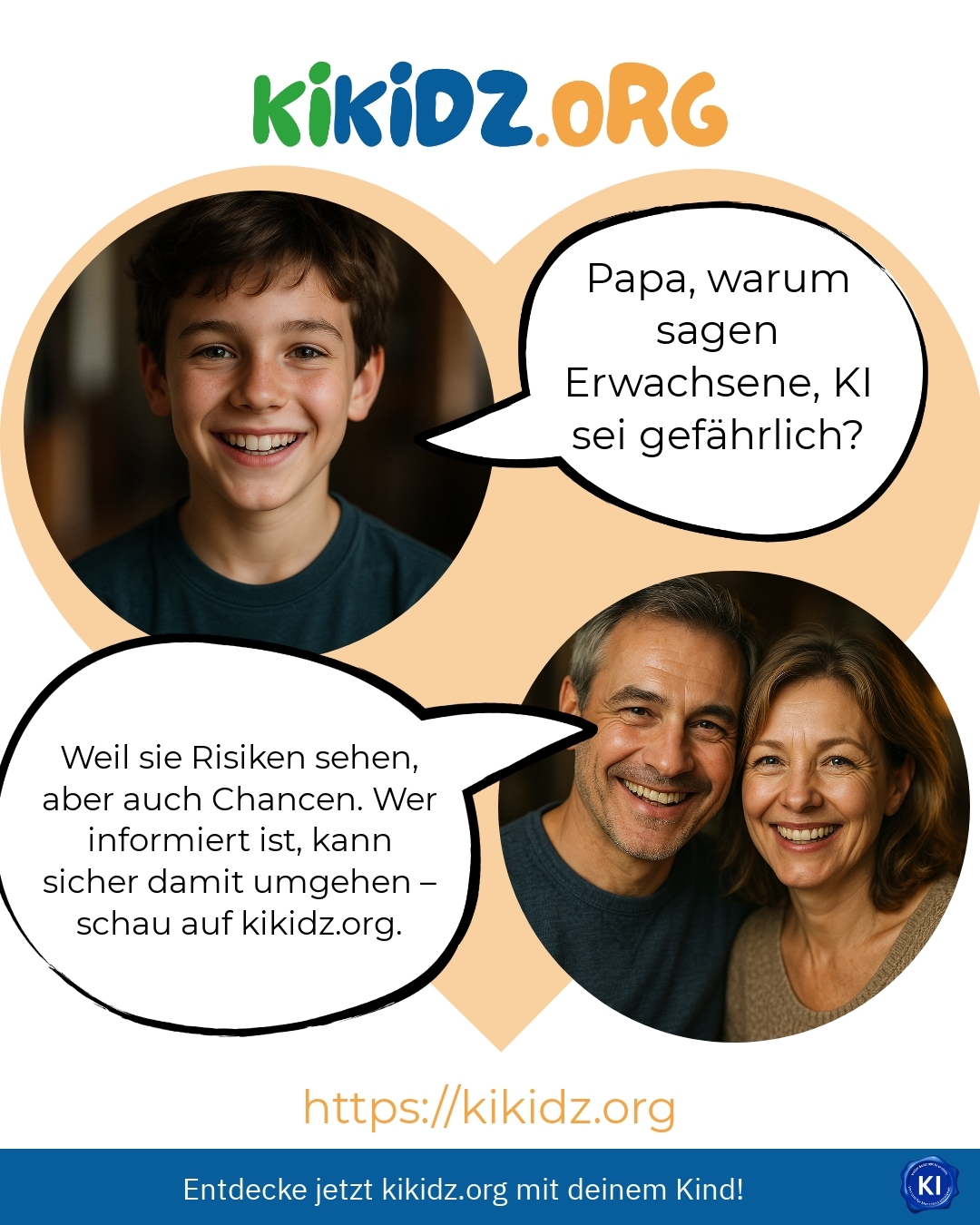The question in everyday life: Dad, why do adults say AI is dangerous?
Children are increasingly presenting their parents with challenges to which there are no simple answers. One example is the question: Dad, why do adults say AI is dangerous? This question reflects curiosity and uncertainty, because many media and conversations report on risks. Parents are often at a loss, but want a transparent and understandable answer. They are looking for explanations that neither frighten nor trivialise.
What does artificial intelligence mean for children and parents?
Artificial intelligence, or AI for short, is influencing almost all areas of life. It helps in the home, at school and in leisure time, but it also brings with it new uncertainties. Parents and carers are noticing: The demands are changing rapidly. They are asking themselves how they can prepare their children for the world of tomorrow. Many say that conversations about AI are becoming more frequent in everyday family life. Some are familiar with situations in which children ask Alexa or ChatGPT questions. Others talk about AI-controlled learning or game apps.
Mum, Dad, why do adults say AI is dangerous? - Typical worries
Adults often have concerns because they fear that AI will make decisions that humans do not always understand. For example, children hear: „AI can be inaccurate“, „It learns prejudices“ or „Our data is not secure“. These concerns should be taken seriously, as AI systems work with data that originates from humans. They can adopt and reinforce existing prejudices if the underlying data is not balanced[1][3][7]. There are examples of women or minorities being disadvantaged by algorithms. The protection of personal data is also a key issue because AI systems can collect a lot of information about us[2][6].
Real examples from everyday family life
Parents often report typical situations:
- The child uses a voice assistant in the nursery and asks about the weather, but suddenly sees adverts that are not age-appropriate.
- A learning programme is used at school that makes suggestions for career choices, but only offers certain professions to boys.
- Families experience that personal data is stored by an app without them knowing exactly what happens to it.
All these examples show why many adults are wary of AI. They want to protect their children because they know that technology is not always neutral.
BEST PRACTICE for parents and teachersTalk openly about AI. Ask your child: „How do you think Alexa works?“ Let them show you which apps and programmes are used. Talk together about advertising, data protection and trust. Show them how to check settings and protect data. Reflect together on whether decisions made by computers are always fair - and why some people are sceptical when they are told that AI is dangerous.
Recommendations for action: How parents can react
Parents don't have to know everything, but they can give impulses and accompany children. Here are three specific tips:
- Show an interest in your children's digital experiences. Regularly ask which apps, games or learning programmes are being used.
- Find out about data protection and privacy together. Use age-appropriate websites to explain what can happen with personal data.
- Talk openly about insecurities and fears. Reassure your child, but do not trivialise risks such as discrimination or data misuse.
Dad, why do adults say AI is dangerous? - The answer must be nuanced
Artificial intelligence is neither good nor bad, but it is a reflection of society. It can help if it is used responsibly. At the same time, it can make mistakes if it learns with incomplete or biased data[1][3][5]. It is therefore important to view AI critically and not to trust it blindly. Parents and teachers should support children in asking questions and drawing their own conclusions.
BEST PRACTICE for parents and teachersUse the training from kikidz.org as the best support. kikidz.org offers practical, age-appropriate workshops for families and schools. Here, children learn what AI is, how it works and where its limits lie. Parents get answers to questions such as: „Dad, why do adults say AI is dangerous?“ and tips for everyday life. The courses are illustrative, interactive and promote critical media skills.
For parents who want to know more
Many parents come to us with these questions:
- How can I prepare my child for the digital world without overwhelming them?
- Which apps and programmes are really suitable for children?
- How do I protect my child's privacy online?
The answers to these questions are not always easy, but together families find ways to deal with them.
My analysis
The question „Dad, why do adults say AI is dangerous?“ represents a generation that is growing up with technology, but is also experiencing its risks. Clear, honest and age-appropriate answers are important. Children should understand that AI offers opportunities, but can also take on prejudices and wants to protect data[1][3][5]. Parents don't have to be experts, but they can be open, listen and learn together. The best inspiration can be found at kikidz.org - where there are training courses that make parents and children fit for the digital world.
Further links from the text above:
AI as a mirror of our society: stereotypes and limits [1]
Artificial intelligence (AI) - advantages and disadvantages [2]
Artificial intelligence (AI) and discrimination - Unia [3]
The role of artificial intelligence in the digital transformation - opportunities and challenges [4]
Bias in artificial intelligence: risks and solutions [5]
Opportunities and risks of artificial intelligence in everyday life [6]
Equality: Discriminated against by the algorithm [7]
Bias in AI systems: How unconscious bias makes your AI dangerous [9]
For more information and if you have any questions, please contact Contact us or read more blog posts on the topic Children and artificial intelligence here. Click here for the courses: Children and artificial intelligence courses
















